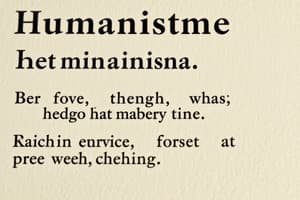Podcast
Questions and Answers
Which term matches the following description: intellectual movement based on the study of the classics?
Which term matches the following description: intellectual movement based on the study of the classics?
Which term matches the following description: local spoken language?
Which term matches the following description: local spoken language?
Which term matches the following description: artistic techniques that give the effect of three-dimensional depth?
Which term matches the following description: artistic techniques that give the effect of three-dimensional depth?
Which term matches the following description: history, moral philosophy, rhetoric, grammar and logic, poetry, mathematics, astronomy, and music?
Which term matches the following description: history, moral philosophy, rhetoric, grammar and logic, poetry, mathematics, astronomy, and music?
Signup and view all the answers
Which term matches the following description: less focused on religion?
Which term matches the following description: less focused on religion?
Signup and view all the answers
As a result of Petrarch's finding and using classical Latin manuscripts, what was the outcome?
As a result of Petrarch's finding and using classical Latin manuscripts, what was the outcome?
Signup and view all the answers
Using movable type for printing in Europe led to increased:
Using movable type for printing in Europe led to increased:
Signup and view all the answers
The human-focused style of Renaissance artists resulted in art that:
The human-focused style of Renaissance artists resulted in art that:
Signup and view all the answers
Art developed by Northern European artists during the Renaissance differed from art of Italian master artists because artists in the North:
Art developed by Northern European artists during the Renaissance differed from art of Italian master artists because artists in the North:
Signup and view all the answers
The humanists' purpose for educating people was to:
The humanists' purpose for educating people was to:
Signup and view all the answers
Study Notes
Renaissance Key Terms and Concepts
- Humanism: An intellectual movement emphasizing the study of classical texts, fostering a focus on human potential and achievements over religious themes.
- Vernacular: Refers to the local spoken language, which gained importance during the Renaissance as literature became more accessible to the general populace.
- Perspective: Artistic technique that allows for the representation of three-dimensional depth on a flat surface, revolutionizing painting during the Renaissance.
- Liberal Studies: Curriculum encompassing subjects like history, moral philosophy, rhetoric, grammar, logic, poetry, mathematics, astronomy, and music, aimed at cultivating a well-rounded education.
- Secular: Focused less on religious themes, reflecting a cultural shift during the Renaissance toward human-centered subjects.
Influence of Petrarch
- Petrarch's discovery and utilization of classical Latin manuscripts led to the spread of humanist ideas, significantly impacting scholarly works and education throughout the Renaissance.
Impact of Printing Technology
- The introduction of movable type printing in Europe resulted in increased literacy rates, enabling wider dissemination of knowledge and a more informed public.
Artistic Trends in Renaissance
- Renaissance artists adopted a human-focused style, utilizing perspective to create artworks that celebrated human experiences while also incorporating religious themes.
- Northern European artists differed from Italian masters, as they adapted their works to fit smaller wall spaces, creating art suitable for books and altarpieces instead of large murals.
Educational Goals of Humanists
- The primary aim of humanist education was to develop well-rounded citizens equipped with a broad knowledge base, rather than focusing solely on preparing individuals for religious life or producing artistic talent.
Studying That Suits You
Use AI to generate personalized quizzes and flashcards to suit your learning preferences.
Description
Test your knowledge of the Renaissance with these flashcards focused on Chapter 15, Lesson 2. Explore key terms such as humanism and vernacular to deepen your understanding of this intellectual movement. Perfect for students looking to reinforce their learning of Renaissance concepts.




